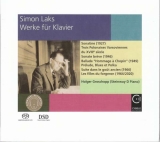Der französisch-polnische Komponist Simon Laks (1901-1983) hat ein vielfältiges Oeuvre hinterlassen, in dem auch die Klavierwerke eine wichtige Rolle spielen. Sie entstammen verschiedenen Phasen seines Komponierens.
Mit einer Dauer von fast einer Viertelstunde ist die neoklassische und durchwegs unbeschwert formulierte Sonatine das längste Werk.
Mit den Trois Polonaises Varsoviennes, einer Bearbeitung von Musik eines unbekannten Komponisten, führt uns der Komponist zurück ins 18. Jahrhundert. Die Suite dans le goût ancien ist neobarock, die Ballade Hommage à Chopin kommt der Musik Chopins sehr nahe, während Les filles du forgeron eine Bühnenmusik für das gleichnamige Stück, Die Töchter des Schmieds, von Peretz Hirschbein ist, die Laks 1964 für eine Inszenierung in Paris schrieb. Er griff dabei auf jiddische Volkslieder zurück. Holger Groschopp hat aus dieser Bühnenmusik eine Suite mit sieben Stücken für Klavier bearbeitet, und so ist eine Sammlung reizvoller Miniaturen entstanden, die eine weitere Farbe in diese CD-Produktion bringt, die mit guten, vitalen Interpretationen und einer guten Tonaufnahme punktet.
The French-Polish composer Simon Laks (1901-1983) left behind a diverse oeuvre, in which the piano works also play an important role. They come from different phases of his composing.
With a duration of almost a quarter of an hour, the neoclassical and thoroughly light-hearted Sonatine is the longest work.
With the Trois Polonaises Varsoviennes, an arrangement of music by an unknown composer, the composer takes us back to the 18th century. The Suite dans le goût ancien is neo-baroque, the Ballade Hommage à Chopin is very close to Chopin’s music, while Les filles du forgeron is incidental music for the play of the same name, The Daughters of the Blacksmith, by Peretz Hirschbein, which Laks wrote for a production in Paris in 1964. In this music, he drew on Yiddish folk songs. Holger Groschopp has arranged a suite of seven pieces for piano from this incidental music, and the result is a collection of delightful miniatures that brings another color to this CD production, which scores with good, vital interpretations and a fine sound recording.
























